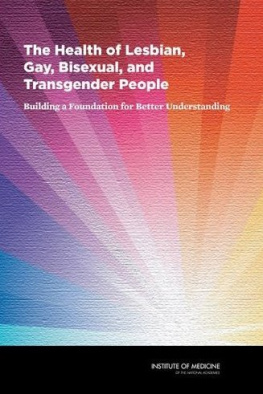Contents

AMERICAN
HOMO
Community and Perversity
JEFFREY ESCOFFIER

This edition published by Verso 2018
First published by University of California Press 1998
Jeffrey Escoffer 1998, 2018
All rights reserved
The moral rights of the authors have been asserted
1 3 5 7 9 10 8 6 4 2
Verso
UK: 6 Meard Street, London W1F 0EG
US: 20 Jay Street, Suite 1010, Brooklyn, NY 11201
versobooks.com
Verso is the imprint of New Left Books
ISBN-13: 978-1-78873-231-4
ISBN-13: 978-1-78873-232-1 (UK EBK)
ISBN-13: 978-1-78873-233-8 (US EBK)
British Library Cataloguing in Publication Data
A catalogue record for this book is available from the British Library
The Library of Congress Has Cataloged the Previous Edition As Follows:
American homo : community and perversity / Jeffrey Escoffer.
p. cm.
Includes bibliographic references (p.) and index
ISBN 0-520-20632-0 (cloth : alk. paper).ISBN 0-520-20633-9 (pbk. : alk. paper)
1. HomosexualityUnited States. 2. HomosexualityPolitical aspectsUnited States. 3. Gay and lesbian studiesUnited States. 4. GaysUnited StatesIdentity. 5. LesbiansUnited StatesIdentity. 6. Gay menUnited StatesPolitical activity. 7. LesbiansUnited StatesPolitical activity. I. Title.
HQ76.3.U5E83 1997
3067660973dc21
97-16513
CIP
Printed in the UK by CPI Group
To those friends and comrades who shared my years at SR, the History Project, and OUT/LOOK and who helped to create a wonderful and exciting intellectual life outside the university.
CONTENTS
It is daunting but nonetheless pleasurable to acknowledge those who, for more than a decade, have helped me think more creatively and write more clearly about the historical and social conditions of gay and lesbian life. When I first began writing these essays, an extraordinary group of friends and colleagues offered encouragement and supportas fellow editors at Socialist Review, as members of the San Francisco Lesbian and Gay History Project, as editors at OUT/LOOK, and as friends and lovers. That group includes Dorothy Allison, Tomas Almaguer, Allan Brub, E. G. Crichton, Lisa Duggan, Jackie Goldsby, Amber Hol-libaugh, Bo Huston, Mark Leger, Donald Lowe, Esther Newton, Ilene Philipson, Gayle Rubin, Michael Sexton, and Howard Winant. Their initial endorsement, emotional nourishment, suggestions for further reading, and sharp criticisms, as well as their own essays and books, have helped make my social and political analysis more honest, meaningful, and useful.
These essays were written over the course of twelve years, and for different audiences, each of which had a distinctive set of operative assumptions. I published the first of them in 1985 and the most recent in 1997. Although not consciously undertaken to explore any one perspective on identity politics, the essays nevertheless have thematic links and overlapping arguments. One recurring theme is the vicissitudes of homosexual identities in the post-World War II United States through the interplay of cultural politics and economic forces. In additon, the essays often stress the role of lesbian and gay intellectuals in the development of gay and lesbian community, the elaboration of identity politics, and the construction of lesbian and gay studies as a form of social knowledge. Many of the essays also touch on the contingency of a collective identity that is always contested, unstable, and full of unresolved differences. Published together these essays interweave the history of sexual revolution, cultural politics, and capitalist development to offer what I hope is an interpretation of gay and lesbian life since the end of World War II. Writing on topics that are somewhat new and undeveloped, and which draw on concepts from across intellectual disciplines, is a difficult process, in part because the analytic frameworks are not yet thoroughly worked out. I have revised most of the essays included hereto update them and delete outdated references, to remove some of the redundancy between essays, and to eliminate any glaring inconsistenciesbut it was impossible to blend them into one seamless narrative.
While writing these essays, I have had conversations with Rudiger Busto, Barbara Epstein, Lisa Hall, Leslie Kauffman, Caitlin Manning, Jim Shoch, William Simon, Judith Stacey, and Ara Wilson at crucial moments. I am also fortunate to have had excellent editors for several of my essays, among them Martin Duberman, Barbara Epstein, Amy Gluckman, Leslie Kauffman, Michael Rothberg, David Trend, and Elliot Weininger. At the University of California Press, my editor, Naomi Schneider, has encouraged me throughout the process. Scott Norton, the Presss production editor, and Eve Kushner, the manuscripts copy-editor, have worked hard to help me make this a better book.
Since moving to New York in 1993, I have relied on a circle of friends who, as I worked to assemble and complete this book, have routinely offered me encouragement, stimulating conversations, and extremely helpful criticisms and comments on my work. That circle includes Chris Bull, John Gagnon, Robert Hughes, Terrence Kissack, Regina Kunzel, Molly McGarry, Fred Morris, Kevin Murphy, Michael Rothberg, Matt Rottnek, and Andrew Spieldenner. Amber Hollibaugh and Loring McAlpin have sustained me through many dark moments and helped keep alive my intellectual vocation. Above all, I am deeply grateful to Matthew Lore, my partner and companion in complicated living. I thank him for his love, his sense of fate, his curiosity, and his intellectual passion. Without these things, I could not have written the most recent essays. He has read more of them than anyone else, and more times than anyone. He has critiqued my essays with grace, a sharp sense of style, and a clairvoyant sensitivity to the truth I sought.
So we are taking off our masks, are we, and keeping
our mouths shut? as if wed been pierced by a glance!
FRANK OHARA, Homosexuality
No social study that does not come back to the
problems of biography, of history and of their
intersections within society has completed its
intellectual journey. Perhaps the most fruitful
distinction with which the sociological imagination
works is between the personal troubles of milieu
and the public issues of social structure.
C. WRIGHT MILLS,
The Sociological Imagination
Am I to become profligate as if I were a blonde?
Or religious as if I were French?
FRANK OHARA,
Meditations In An Emergency
The desire to live honestly underlies the political emergence of lesbians and gay men in our time.life of anyone who must confront it. Although we become ourselves in that moment of recognition, we also discover the injunctions of the law, the punitive rule of normalcy, and the ferocity of social exclusion. We see that our selves are traversed by social processes that shape our lives.
That cathartic moment initiates three phases of homosexual emancipation. In the first one, we begin to narrate our autobiographies in new ways. Out of necessity, we start to theorize what has happened to us and seek to recreate our place in society. In our autobiographies, we find our responsibilitiesto the realization of our desires.
In the next phase, we discover ourselves and begin to learn the social skills that enable us to share our desires, achieve bodily pleasures (perhaps even moments of bliss), and build fragile solidarities with others. In the course of our trajectory, which is one of emancipation from stigma and self-hatred, we strive to act as though we are real members of society. We say to ourselves, I want recognition and acceptance of my difference.

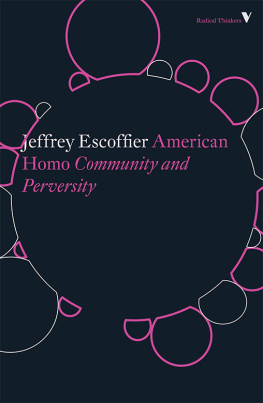
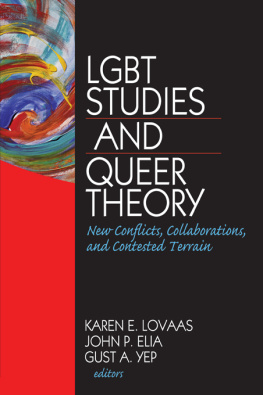
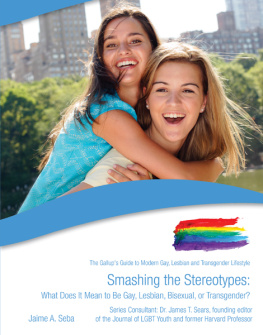
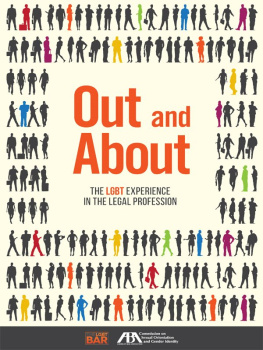

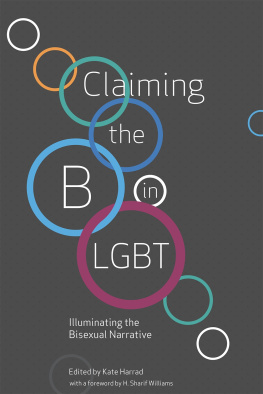
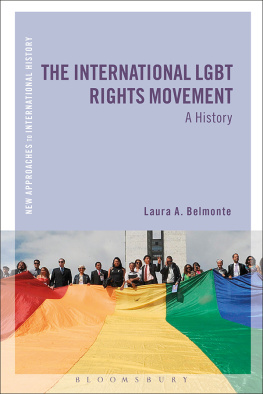
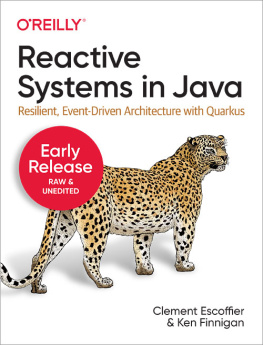
![Chuck Stewart - Lesbian, Gay, Bisexual, and Transgender Americans at Risk [3 Volumes]: Problems and Solutions](/uploads/posts/book/129596/thumbs/chuck-stewart-lesbian-gay-bisexual-and.jpg)
